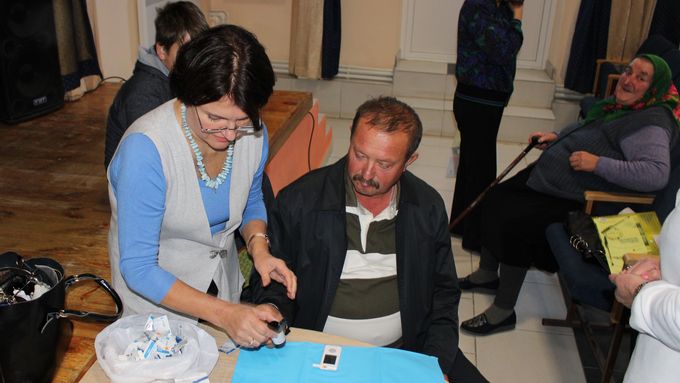Reducing the Burden of Non-Communicable Diseases in Moldova
13.06.2019
In Moldova, over half of the population suffers from non-communicable diseases (NCDs). The Government of the Republic of Moldova and the Swiss Agency for Development and Cooperation created the Healthy Life Project, implemented by Swiss TPH, with the aim to reduce the burden of NCDs with a focus on rural areas. On 5-7 June, the 3rd International Conference on Non-Communicable Diseases took place in Chisinau, addressing topics such as improvement in primary healthcare, people-centred integrated care and modern approaches in health promotion.

NCDs account for 85.6% of deaths annually in Moldova.
Reducing health inequalities to achieve Universal Health Coverage
Non-communicable diseases (NCDs) are the leading cause of death worldwide. Like many countries, the Republic of Moldova faces a growing NCD mortality and morbidity burden: more than 50% of the population suffers from non-communicable diseases, including cardiovascular diseases, cancer, diabetes and chronic respiratory diseases. The probability of dying of these four diseases between the age of 30 and 70 years is 26%, with NCDs accounting for 85.6% of deaths annually in the country.
In the last decade, the Government of the Republic of Moldova has taken important steps to tackle NCDs and their risk factors through the adoption of numerous national strategies, policies as well as a number of inter-sectoral or disease specific programmes. These efforts are embedded in broader health systems strengthening reforms in the last two decades that aim to reduce health inequalities and achieve Universal Health Coverage (UHC).
In January 2017, the Government of the Republic of Moldova and the Swiss Agency for Development and Cooperation (SDC) created the "Healthy Life Project: Reducing the Burden of Non-Communicable Diseases in Moldova", implemented by Swiss TPH, with the aim to reduce the burden of NCDs in Moldova.
Healthy Life Project
The Healthy Life Project (Viață Sănătoasă Project) contributes to the improvement of the health status of the Moldovan population, especially in rural populations, through the reduction of the burden of NCDs by facilitating the adoption of evidence-based approaches to health promotion. The project's approach is to facilitate the organisation of an inter-sectoral response to NCDs with improved health intervention planning, better collaboration and management, as well as to promote models of integrated care and outreach services.
"By working closely with the social sector, involving citizens in decisions related to their health, and building the capacities of local public authorities and district-level officials, the Healthy Life Project facilitates a shared understanding of innovative approaches to health promotion," said Helen Prytherch, Project Lead of the Healthy Life Project at Swiss TPH.
UHC calls for integrated care and multi-sectoral collaboration
As part of the baseline for the Healthy Life Project, a survey on primary health care facilities and pharmacies across 20 districts was conducted by Swiss TPH to provide an update on the state of NCD service provision at the primary healthcare level in Moldova. This has been recently published in the BMC Health Services Research journal.
The study identified gaps in service provision, which require broad health system improvements to ensure NCD related policies and strategies are embedded into primary healthcare service provision. It concluded that ensuring UHC calls for integrated care and multi-sectoral collaboration at all levels of the public and private sectors, including education, social services, sociocultural activities and local administration.
NCD conference in Chisinau
The Republic of Moldova held its 3rd International Conference on Non-Communicable Diseases on 5-7 June 2019 at the Medical State University in Chisinau. The Ministry of Health, Labour and Social Protection and the National Agency for Public Health spearheaded the event, alongside the World Health Organization, the University of Iowa, the Babeș-Bolyai University, Romania and the Healthy Life Project.
The conference brought together international and national partners as well as patient advocates to discuss new research, ideas and approaches related to prevention and control of NCDs. The Healthy Life Project together with national and local partners organised workshops on continuous quality improvement in primary healthcare for NCD patients, people-centred integrated care, planning of public health actions based on health profiles, and modern approaches in health promotion.
"Fostering inter-sectoral collaboration on health promotion and integrated care is never an easy process but it is critical for us to tackle the burden of NCDs, increase citizens' levels of health literacy to reduce their NCDs risk behavior and for the country to achieve the 2030 Sustainable Development Agenda on good health and well-being." said Ala Curteanu, Project Manager of the Healthy Life Project.
Contact

Helen Prytherch
PhD, MPH
Head of Unit, Project Leader, Deputy Head of Department
+41612848686
helen.prytherch@swisstph.ch
- Healthy Life Project
- Family Medicine and Integrated Care at Swiss TPH
- Ministry of Health, Labour and Social Protection Republic of Moldova
- Swiss Agency for Development and Cooperation in Moldova
- Publication: Quality of care for non-communicable diseases in the Republic of Moldova: a survey across primary health care facilities and pharmacies
Stay connected
Subscribe to our newsletter and get all the latest research news, project updates, course and event listings from Swiss TPH.